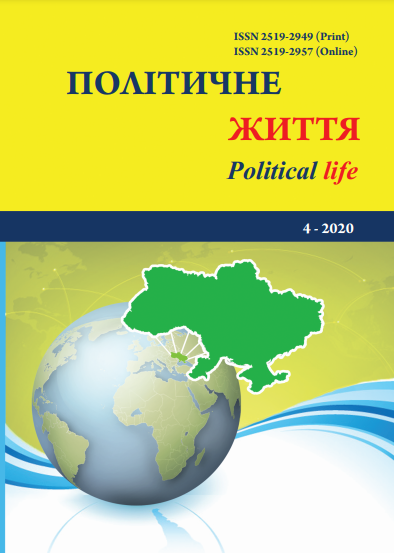The Impact of Disintegration Processes in Europe on Brexit
DOI:
https://doi.org/10.31558/2519-2949.2020.4.12Keywords:
Great Britain; Brexit; European Union; disintegration processes; European integration; Euroscepticism; crisis phenomena in EuropeAbstract
The article focuses on the reasons of Brexit that are related to disintegration processes in the European Union, which are caused by crises in Europe, such as the migration crisis, slowing economic growth in the Euro zone, the growing debt crisis in Southern Europe etc. The article also analyzes the impact of some consequences of the European integration on the British decision to leave the European Union. In particular, the article examines deepening the European integration and the gradual transformation of the EU into a union that is increasingly reminiscent of a federal state, as a factor that prompted British Eurosceptics to actively campaign for Brexit. The bureaucracy and the lack of a mechanism for the direct election of the European Commission and other European supranational institutions in Brussels is also examined in the article as one of the factors of Britain’s exit from the EU. The article demonstrates that during Britain’s membership in the European Union, the problem of mass labor migration from the countries of Central-Eastern Europe to the United Kingdom was one more factor that affected the growing Euroscepticism in the country and made the electorate to vote for Breit. The article examines Brexit in the context of the European disintegration processes and compares Britain with some other European countries, which, like the United Kingdom, are quite reluctant to deepen European integration, but unlike Britain are unlikely to consider such a radical step as exit from the EU. The author concludes that the crisis in continental Europe had a decisive influence on Britain’s decision to leave the European Union, although at the same time Brexit would not have happened without the impact of British domestic policy factors. The internal political reasons for Brexit are not discussed in detail in the article, as its main focus is on the foreign policy factors related to Britain’s reaction on the problems of continental Europe, such as the mass labor migration, the policy of supranational European institutions in Brussels, which is not always effective and agreed with London, and economic inequality between the countries of Southern and Central-Eastern Europe and their partners from Northern and Western Europe.
References
Menon A. EU Referendum Has Changed Everything and Nothing. UK in a Changing Europe, 26 Jun 2020. URL: https://ukandeu.ac.uk/eu-referendum-has-changed-everything-and-nothing/ (дата звернення: 23.11.2020).
Portes J. Immigration Between the Referendum and Brexit. UK in a Changing Europe, 20 June 2020. URL: https://ukandeu.ac.uk/long-read/immigration-between-the-referendum-and-brexit/ (дата звернення: 23.11.2020).
Harrois T. Foreign Policy and the Brexit Negotiations. UK in a Changing Europe, 15 June 2020. URL: https://ukandeu.ac.uk/foreign-policy-and-the-brexit-negotiations/ (дата звернення: 23.11.2020).
Brendan D. Britain and European federalism. URL: https://fedtrust.co.uk/wp-content/uploads/2016/05/ Britain_and_European_federalism.pdf (дата звернення: 23.11.2020).
Jónsdóttir J. It would Be Difficult for the UK to Follow the ‘Swiss’ or ‘Norwegian’ Models as an Alternative to EU Membership. European Politics and Policy, 28 January 2013. URL: https://blogs.lse.ac.uk/ europpblog/2013/ 01/28/uk-eu-euroscepticism-norway-model-swiss-model-efta/#Author (дата звернення: 23.11.2020).
Briggs M. Euroscepticism on the Rise in UK. EURACTIV.com, 27 March 2015. URL: https://www.euractiv.com/section/uk-europe/news/euroscepticism-on-the-rise-in-uk/ (дата звернення: 23.11.2020).
Greece Government Debt to GDP1980-2019 Data. Trading Economics. 2019. URL: https://tradingeconomics.com/greece/government-debt-to-gdp (дата звернення: 23.11.2020).
Atkins R. A Year in a Word: Grexit. Financial Times, 23 December 2012. URL: https://www.ft.com/content/9e59bcfc-4b74-11e2-88b5-00144feab49a (дата звернення: 23.11.2020).
Allen K. Greek Impasse Raise Fears of ‘Grexit’. The Guardian. 7 February 2012. URL: https://www.theguardian.com/business/economics-blog/2012/feb/07/greek-impasse-fears-grexit (дата звернення: 23.11.2020).
Oprita A. Debt of PIGS Weighs On European Union. CNBC News, 26 January 2010. URL: https://www.cnbc.com/id/34844547 (дата звернення: 23.11.2020).
Daponte-Smith N. Grexit And Brexit: Greek Default Would Affect Britain, Too. Forbes, 17 June 2015. URL: https://www.forbes.com/sites/noahdapontesmith/2015/06/17/grexit-and-brexit-greek-default-would-affectbritain-too/?sh=1820348630b1 (дата звернення: 23.11.2020).
Italy Government Debt to GDP. 1988 – 2019 Data. Trading Economics. 2019. URL: https://tradingeconomics.com/italy/government-debt-to-gdp (дата звернення: 23.11.2020).
Terzi I. Grexit and Brexit: Lessons for the European Union. E-International Relations, 4 May 2020. URL: https://www.e-ir.info/2020/05/04/grexit-and-brexit-lessons-for-the-eu/ (дата звернення: 23.11.2020)
Porritt L. Britain and Europe: The Political and Economic Repercussions of the Crisis. UK in a Changing Europe. 14 Jul 2015. URL: https://ukandeu.ac.uk/explainers/britain-and-europe-the-political-and-economicrepercussions-of-the-crisis/ (дата звернення: 23.11.2020).
Ritzena J, Wehnera C., Zimmermannb F. Euroskepticism, Income Inequality and Financial Expectations. 2015. URL: http://ftp.iza.org/dp8001_rev.pdf (дата звернення: 23.11.2020).
Hall R. How the Brexit campaign used refugees to scare voters. Global Post, 24 June 2016. URL: https://www.pri.org/stories/2016-06-24/how-brexit-campaign-used-refugees-scare-voters (дата звернення: 23.11.2020).
Poland and the UK: Common Interests, Shared Concerns. British Council. 2018. URL: https://www.britishcouncil.org/research-policy-insight/insight-articles/poland-and-uk (дата звернення: 23.11.2020).
Travis A. 80% of Britain’s 1.4m Eastern European Residents Are in Work. The Guardian, 10 July 2017. URL: https://www.theguardian.com/world/2017/jul/10/majority-of-britain-eastern-european-residents-are-in-work (дата звернення: 23.11.2020).
Rankin J. Is the EU Undemocratic? The Guardian, 13 June 2016. URL: https://www.theguardian.com/world/2016/jun/13/is-the-eu-undemocratic-referendum-reality-check (дата звернення: 23.11.2020).
Wintour P., Watt N. UKIP wins European Elections with Ease to Set Off Political Earthquake. The Guardian, 26 May 2014. URL: https://www.theguardian.com/politics/2014/may/26/ukip-european-electionspolitical-earthquake (дата звернення: 23.11.2020).
Townsend M. Five Million Votes, Two Seats: Smaller Parties Demand a Change in The Rules. The Guardian, 9 May 2015. URL: https://www.theguardian.com/politics/2015/may/09/margate-ukip-greens-electoralreform-farage (дата звернення: 23.11.2020).
Analysis: Brexit is Vote Against the ‘Establishment’. ITV News, 24 June 2016. URL: https://www.itv.com/news/update/2016-06-24/analysis-brexit-is-vote-against-the-establishment/ (дата звернення: 23.11.2020).
Cox M. 2017. The Rise of Populism and The Crisis Of Globalisation: Brexit, Trump and Beyond. Irish Studies in International Affairs. № 28. P. 9 – 17.
Khan S. Brexit Could Spell the End of Globalization, and the Global Prosperity That Came With It. The Conversation, 13 January 2020. URL: https://theconversation.com/brexit-could-spell-the-end-of-globalizationand-the-global-prosperity-that-came-with-it-128280 (дата звернення: 23.11.2020).
Younge G. Brexit Fatigue Is No Reason to Leave the EU. The Nation, 24 October 2019. URL: https://www.thenation.com/article/archive/brexit-fatigue/ (дата звернення: 23.11.2020).

